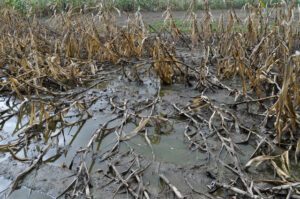
Photo Credit: Elissa Jun/FEMA, Public Domain
Sentera Launches Crop Damage Analysis Platform
DRONELIFE Staff Writer Ian J. McNabb
Continue reading below or listen.
CentellaA Minnesota company that specializes in agricultural analytics recently announced the launch of a crop damage analysis platform to support critical decision-making on mitigation strategies for unforeseen weather events. With the increasing number of unpredictable extreme weather patterns caused by global warming, technology is becoming increasingly important to help farmers and other customers protect their crops. The United States Farm Service Federation reported that 2022 was the third-worst disaster year on record, causing more than $21.4 billion in damage. Loss of crops and rangelands.
Technology can help. Sentera Chief Technology Officer Eric Taipale said in a press release: Crop Damage Analysis provides customers with fast, accurate and precise insight into the location and extent of damage. Customers can use this information to inform mitigation measures and update management strategies to optimize profitability and agricultural performance. Sentera’s data tools transform aerial imagery into actionable plant-level information, resulting in improved decision-making capabilities and enabling optimization of “boot on the ground” resources.
This flexible approach builds on UAV technology, demonstrating its growing impact across the agricultural sector. Installed in drones such as the DJI Mavic 3, Sentera’s flexible sensor package utilizes an additional camera alongside the drone’s main camera and is used in conjunction with Sentera’s data model to determine tree canopy, crop area, and more. , crop health, elevation, hydrology and other measurements can be determined. Flowering, height and lodging, residue cover, and stand number. New crop damage analysis platforms can use this data to inform resource allocation, reforestation and crop management. In addition, Sentera’s crop damage solutions streamline the crop insurance process and assist in efficient and accurate claims processing. Extreme weather remains an operational risk for agricultural customers, but better data models will undoubtedly give farmers the information they need to respond.
read more:
Ian McNabb is a staff writer based in Boston, Massachusetts. His interests include geopolitics, emerging technologies, environmental sustainability, and sports at Boston University.
Miriam McNabb, editor-in-chief of DRONELIFE and CEO of professional drone services marketplace JobForDrones, is a keen observer of the emerging drone industry and drone regulatory environment. Miriam is an international speaker and industry recognized figure, with over 3,000 articles focused on the commercial drone space. Miriam has a degree from the University of Chicago and he has over 20 years of experience in high tech sales and marketing new technologies.
For drone industry consulting or writing, email Miriam.
twitter:@spaldingbarker
Subscribe to Drone Life here.
